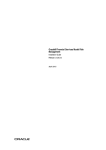Download Oracle Financial Services Institutional Performance Analytics
Transcript
Oracle Financial Services Institutional Performance Analytics Product Installation Manual Version 6.0.2.0.0 April 2014 Document Control Author: Niraj Ranjan Biswal Created on: 17-Feb-2014 Updated by: Fino Paul Updated on: 29-Mar-2014 Group: OFSAA Revision No: 1.0 Reviewed by: Aravind Venkatraman Reviewed on: 1-Apr-2014 Approved by: Aravind Venkatraman Approved on: 1-Apr-2014 Installation Manual Table of Contents About this Manual ........................................................................................................................ 1 Audience ...................................................................................................................................... 1 Scope........................................................................................................................................... 1 Organization of the Manual ......................................................................................................... 1 Conventions Used in this Manual ................................................................................................ 1 Prerequisites ................................................................................................................................ 2 Environment................................................................................................................................. 2 Prerequisites ................................................................................................................................ 2 Front-End Access ........................................................................................................................ 3 Pre-Installation Activities ............................................................................................................. 4 Pre-Upgrade Activities ................................................................................................................. 6 OFSIPA v6.0.2.0.0 Installation .................................................................................................. 10 Machine A – Product App Layer ................................................................................................ 11 Machine B – Product Database Layer ....................................................................................... 24 Machine C – Product Web Layer............................................................................................... 30 Silent Installation........................................................................................................................ 38 Post Installation Activities .......................................................................................................... 42 OFSIPA Configuration ............................................................................................................... 47 User Roles in Customer Insight ................................................................................................. 52 Configure Roles and Groups ..................................................................................................... 55 Troubleshooting ......................................................................................................................... 60 Documentation........................................................................................................................... 61 About this Manual The Oracle Financial Services Institutional Performance Analytics (OFSIPA) provides strategic insights on - Profitability of the business and the underlying customers, Product holdings and Relationship depth across the organization (Corporate client and any of its subdivisions or subsidiaries),Behavioral and Engagement trends of its target segments – exposures, commitments, line utilization, assets/liabilities, deposits, withdrawals, Fees, Income, recent transactions and so on, Efficiency of investments (like marketing, partner development), Efficiency of the sales force in terms of ongoing customer revenue generation, cross-sell and up-sell, product usage and pipeline. Audience This Manual is meant for use by the Oracle Financial Services Analytical Applications Infrastructure (OFSAAI) System Administrator. It provides step-by-step instructions necessary for installing the OFSIPA v6.0.2.0.0. Scope This manual provides a step-wise instructions to install the OFSIPA Product in an existing OFSAAI hosted in Oracle 11g R2 (11.2.0.2.0) environment. Organization of the Manual The Installation Manual is organized into the following chapters. o Prerequisites section identifies the hardware and base software environment that is required for a successful installation and functioning of OFSAAI. o Pre-Installation Activities section details the pre-installation activities followed. o Pre-Upgrade Activities section details about the pre-upgrade activities required to be performed. o OFSIPA v6.0.2.0.0 Installation section details the step-by-step instructions on the various installation options. o Post Installation Activities section details the steps that are required to be performed after a successful installation of the OFSAAI. Conventions Used in this Manual References to sections or chapters in the manual are displayed in Italics. Screen names are displayed in the following manner: Introduction screen Options and buttons are displayed in Bold. Notes are displayed as follows: NOTE o It is important that the password should be 6 characters long. If you do not adhere to this pre-requisite, you will see a system message that reads Password must be at least 6 characters long. 1 Prerequisites The installation process requires certain environmental variables to be set prior to starting the installation. Ensure that these requirements are met before starting the installation. Refer to the Release Notes for the latest updates on hardware or software requirements and the OFSAAI Installation Manual for the environment variables. Environment Installation of OFSIPA v6.0.2 Product requires the Oracle 11g R2 (11.2.0.2.0) version of OFSAAI v7.3.3.2.4, to be installed in either a single-tier or multi-tier environment. It is implicit that all base software versions and patch levels required by the RHEL/OEL-5.3/5.5 version of OFSAAI 7.3 is available and adhered to. NOTE o If you are doing an up-gradation make sure that OFSAAI has been upgraded from v7.2 (Release no – 7.2.10) to v7.3.3.2.4. o The Oracle Financial Services Institutional Performance Analytics v6.0.2.0.0 installer download contains only the ERwin XML file that is required for uploading the model. This file is sufficient to install the v6.0.2.0.0 product. However, this XML file cannot be opened in the ERwin Data modeler tool and hence cannot be used for any data model customization. ERwin file is delivered as a patch and needs to be downloaded separately. This ERwin file should be used for any customization of the data model. The reference bug/patch where ERwin file can be downloaded is 18425388. Prerequisites The Oracle 11g R2 (11.2.0.2.0) version of OFSAAI v7.3 and OBIEE 11.1.1.7.1 on any supported operating system once installed must be configured. For upgrading OFSAAI 7.3.3.2.0 to 7.3.3.2.4, please apply the below patch: o 18042631_GENERIC.zip 2 Front-End Access o Internet Explorer 8.0/9.0 o Java Plug-in 1.6.0_21 o Acrobat Reader 8.0 o The screen resolutions supported are 1024*768 and 1280*1024 NOTE o Ensure that Java Plug-in is enabled in the browser settings. 3 Pre-Installation Activities The following is the Pre Installation checklist to ensure the readiness to start installing OFSIPA Product: o OFSAAI v7.3.3.2.4 must be successfully installed on Oracle 11gR2 (RAC) (11.2.0.2.0). o If Infrastructure installation is on multitier environment, execute the following commands in the DB Layer terminal. chmod -R 777 < ftpshare folder> o Navigate to ftpshare folder and set the umask shown as below, this will make sure all the new files created will have 666 file permission. cd < ftpshare folder > umask 0000 o The Config and application schema should be two distinct oracle database users. o Execute the following grants in config schema. Replace ATOMIC_SCHEMA_ORACLE_USER with the atomic schema user. grant select on METADATA_MASTER to <ORACLE_USER> grant select on METADATA_ELEMENT_MASTER to <ORACLE_USER> grant select on METADATA_LOCALE_MASTER to <ORACLE_USER> grant select on BATCH_MASTER to <ATOMIC_SCHEMA_ORACLE_USER> o Oracle database User for Application schema should have the below grants: grant create session to <ORACLE_USER>; grant create ANY INDEX to <ORACLE_USER>; grant create PROCEDURE to <ORACLE_USER>; grant create SEQUENCE to <ORACLE_USER>; grant DEBUG CONNECT SESSION to <ORACLE_USER>; grant create TABLE to <ORACLE_USER>; grant create VIEW to <ORACLE_USER>; grant create trigger to <ORACLE_USER>; grant create type to <oracle_user>; grant select on sys.v_$parameter TO <oracle_user>; grant CREATE TYPE to <ORACLE_USER> grant CREATE MATERIALIZED VIEW to <ORACLE_USER) o Copy the entire OFSIPA v6.0.2.0.0 installer download directory to the server location (Including the DataModel directory). Provide read, write and execute permission to all the files present in this directory. o Specify the log file path and name in the log4j.xml. Update the “value” attribute marked in the following picture 4 Figure 1: Log4j.xml file configuration o Make sure the path given in the log4j.xml file has read/write/execute permission. o Execute the “config_table_privileges_for_application_user.sql” script in configuration schema. This file will be present inside $FIC_HOME directory. o Make sure FICServer is up and running before proceeding for installation. 5 Pre-Upgrade Activities 1. Upgrade the AAI platform to 7.3.3.2.4. 2. Upgrade OBIEE to 11.1.1.7.1. 3. ATOMIC schema user must have the following grants: a. Grant CREATE TYPE to <ATOMIC SCHEMA ORACLE USER> b. Grant CREATE MATERIALIZED VIEW to <ATOMIC_SCHEMA_ORACLE_USER>. 4. Execute the following grant on configuration schema to give privileges to atomic schema user. a. Grant select on BATCH_MASTER to <ATOMIC_SCHEMA_ORACLE_USER> 5. Atomic user must have SELECT privilege on the following Config schema tables. METADATA_MASTER METADATA_ELEMENT_MASTER METADATA_ATTRIBUTE_MASTER METADATA_LOCALE_MASTER 6. If certain customization were done to the T2T extract and mapping definitions, those will be lost. Hence, take a back-up of the following two folders and redo the customization in the new T2T extract and mapping definitions after Service Pack installation. <FTPSHARE_PATH>/STAGE <FTPSHARE_PATH>/<INFODOM>/erwin/sources 7. Bring down all the OFSAAI Servers. 8. If Datamodel is customized, 1. Open both (prior uploaded and the one with the current service pack) the models using Erwin Data Modeler tool. 2. Go to Tools and Select Complete Compare. 3. In the Compare window, select your prior uploaded CRMIPA_Datamodel on Left Model. 4. Select extracted CRMIPA_Datamodel on Right Model. 5. In Type Selection, check Subject Area. 6. In Advanced option un-check ALL except Auto Close Database/Script Models. 7. Click Compare. 8. Resolve Differences by applying all the changes mentioned in <INSTALLER_EXTRACTED_DIRECTORY>/OFSIPA DataModel Differences 60100 to 60200.xls. OFSIPA DataModel Differences 60100 to 60200.xls file contains the following sheets: o New Table 6 o Dropped Tables o New Columns o Dropped Columns o Data Type Changes o Null Changes o PK Changes o FK Changes o Domain Changes 9. Click Finish and Close. 10. Save the file as XML in "All Fusion Repository Format". For example, CRMIPA_Datamodel.xml. 11. Copy the modified existing into the location: "ftpshare/*INFODOM*/erwin/erwinXML". 12. Perform Incremental/Sliced Model Upload in the Information domain where OFSIPA application is installed. 10. If Datamodel is not customized, 1. Execute CIIPA_pre_scripts_601_602.sql in the atomic schema before doing model upload and execute CRMIPA_602_Preinstall_scripts.sql in Config schema, only if the Institutional Performance Analytics is installed on the Infodom and no other CI applications are installed. Note: In the file "CRMIPA_602_Preinstall_scripts.sql", replace the placeholder ##INFODOM## with the name of the infodom before execution. 2. Perform the following in the atomic schema. o Stg_Loan_Contracts - Update the columns with null values v_joining_score. o Stg_Annuity_Contracts - Take a backup of the columns v_cust_ref_code. o Stg_Futures - Take a backup of the columns v_cust_ref_code, v_instr_issuer_code, v_issuer_code and update the columns with null values. o Stg_Fx_Contracts - Take a backup of the columns v_cust_ref_code and update the column with null values. o Stg_Guarantees - Take a backup of the columns v_instr_issuer_code and update the column with null values. o Stg_Investments - Take a backup of the columns v_cust_ref_code, v_issuer_code, v_issuer_type and update the columns with null values. o Stg_Loan_Contracts - Take a backup of the columns v_instr_issuer_code, v_org_unit_code and update the columns with null values. 7 o Stg_Lob_Master - Take a backup of the columns v_level10_lob_code, v_level11_lob_code, v_level12_lob_code, v_level13_lob_code, v_level14_lob_code, v_level15_lob_code, v_level16_lob_code, v_level1_lob_code, v_level2_lob_code, v_level3_lob_code, v_level4_lob_code, v_level5_lob_code, v_level6_lob_code, v_level7_lob_code, v_level8_lob_code, v_level9_lob_code, v_line_of_business_desc and update the columns with null values. o Stg_Mm_Contracts - Take a backup of the columns v_cust_ref_code, v_issuer_code and update the columns with null values. o Stg_Mutual_Funds - Take a backup of the columns v_cust_ref_code, v_issuer_code and update the columns with null values. o Stg_Od_Accounts - Take a backup of the column n_credit_score and update the column with null values. o Stg_Option_Contracts - Take a backup of the columns v_cust_ref_code, v_instr_issuer_code and update the columns with null values. o Stg_Repo_Contracts - Take a backup of the columns v_cust_ref_code, v_instr_issuer_code, v_issuer_code and update the columns with null values. o Stg_Swaps_Contracts - Take a backup of the columns v_cust_ref_code, v_issuer_code and update the columns with null values. o Stg_Td_Contracts - Take a backup of the columns v_prev_contract_code and update the column with null values. o Stg_Applications - Take a backup of the table. Truncate all the records from the table. o Stg_Account_Rating_Details - Take a backup of the table. Truncate all the records from the table. o Stg_Country_Master - Take a backup of the table. Truncate all the records from the table. o Stg_Customer_Email_Address - Take a backup of the table. Truncate all the records from the table. o Stg_Party_Financials - Take a backup of the table. Truncate all records from the table. o Stg_Party_Rating_Details - Take a backup of the table. Truncate all the records from the table. o Stg_Limit_Structure - Take a backup of the table. Truncate all the records from the table. Examples o To update the column with null values of column n_net_credit_losses in Stg_Bills_Contracts, UPDATE Stg_Bills_Contracts SET n_net_credit_losses = null. o To take a backup of the columns v_cust_ref_code of Stg_Annuity_Contracts create a backup table Stg_Annuity_Contracts_BKP selecting the PK columns and the columns to be backed up, CREATE TABLE Stg_Annuity_Contracts_BKP AS SELECT v_account_number, fic_mis_date, v_cust_ref_code FROM Stg_Annuity_Contracts. 8 o To take a backup of the table. Truncate all the records from the table Stg_Applications, CREATE TABLE Stg_Applications_BKP AS SELECT * FROM Stg_Applications and TRUNCATE TABLE Stg_Applications. Note: Perform Incremental Model Upload in the information domain where CRMIPA application is installed. Extract the contents of the folder and start the install 1. To begin OFSIPA product installation, execute Setup.sh .Details about Silent and UI modes of installation have been explained in the following sections. 2. When the installer prompts for choosing Infodom, select the existing infodom that has to be upgraded to 6.0.2.0.0. Refer to Step 6 of installation for more details. Procedure to change the find icon available on hierarchical prompts 1. Copy the image find_ena.png from the location: OBIEE_HOME\Oracle_BI1\bifoundation\web\appv2\res\sk_blafp\common and save a copy of it as search_ena.png. 2. Replace the image with the existing “search_ena.png” image available in the following locations in OBIEE 11.1.1.7.0 Home. o C:\OBIEEHome\Oracle_BI1\bifoundation\web\appv2\res\sk_blafp\common o C:\ OBIEEHome\Oracle_BI1\bifoundation\web\appv2\res\sk_blafp\common\rtl o C:\OBIEEHome\user_projects\domains\bifoundation_domain\servers\AdminServ er\tmp\_WL_user\emcore\28c293\images o C:\OBIEEHome\user_projects\domains\bifoundation_domain\servers\bi_server1\t mp\_WL_user\analytics_11.1.1\7dezjl\war\res\sk_blafp\common o C:\OBIEEHome\user_projects\domains\bifoundation_domain\servers\bi_server1\t mp\_WL_user\analytics_11.1.1\7dezjl\war\res\sk_blafp\common\rtl 3. After successfully replacing the image, restart the OBIEE services. 4. Log in to Dashboards and check for the image. 9 OFSIPA v6.0.2.0.0 Installation The OFSAAI Product comprises of components that are installed in Web, Application, and Database layer. Hence if you have installed OFSAAI 7.3 in a multi-tier architecture, the OFSIPA Product installer must be invoked on each of the machines that host the OFSAAI tier. For a Single-tier installation, the installer is required to be invoked only once on the machine that hosts all the OFSAAI tiers. This section describes the installation process where the Three Product setup components are installed on separate machines in with the Product installation on separate machines. Machine A will be used to install Product Application Layer components, Machine B will be used to install Product Database Layer components and Machine C will be used to install Product Web Layer components. Note: This section holds applicable if OFSAAI v7.3.3.2.4 is installed on Oracle 11g on separate machines A, B, and C respectively. If a silent installation is required, refer to Silent Installation section. 10 Machine A – Product App Layer Step 1 To begin OFSIPA product installation, execute Setup.sh. Figure 1: Installation Splash Screen Step 2 Figure 2: Introduction Screen Upon invoking the installer, the Introduction screen will display the prerequisites for installation. Ensure that the prerequisites are satisfied before you proceed. Step 3 Choose the log mode for this installer. 11 Figure 3: Log Mode Option Screen Step 4 Provide the 9 digit Customer Identification number provided during the OFSAAI installation. Figure 4: Customer ID Input Screen Click Next to continue. 12 Step 5 The Pre Setup Information screen requests for setup information. Select the appropriate OFSAAI layer that has been installed on the machine. Example App Layer Figure 5: Pre Setup Information Screen – Choose Layer to Install Note: o For a single-tier OFSAAI v7.3.3.2.4 installation, select App Layer and DB Layer. o For a multi-tier OFSAAI v7.3.3.2.4 installation, select the corresponding layer installed on the machine. 13 Step 6 This panel seeks information on whether a new infodom has to be created or the existing infodom to be used for apps installation. Choose the required option. Figure 6: Pre Setup Information Screen – Infodom type Click Next to continue. Step 7-i If the option New Infodom was chosen in the previous panel then the following panel will be next displayed which will seek information of the following details to create infodom. Specify a DB name for the new infodom. Make a TNS entry with the DB name specified in the tnsname.ora file in the oracle server. Enter the newly created application schema user name, password, jdbc url in relevant fields. Click Next to continue Figure 7: Database details for the new Infodom Step 7-ii If the option New Infodom was chosen in the previous panel then the following panel will be displayed following the panel 7-i which will seek further information of the following details to create infodom. 14 Specify the name and description for the new infodom to be created. Specify a segment name to be created. Note: Segment and Infodom name should not exceed 10 Characters Also specify the Application server and database server log path for infodom maintenance (to be created) Figure 8: Infodom details for creation of new Infodom NOTE o The OFSAAI user must have a role that is able to perform Add/Modify functions for OFSIPA metadata. Click Next to continue. Step 7-iii If the option New Infodom was chosen in the previous panel then the following panel will be displayed following the panel 7-ii which will display the pre-infodom creation details. Check and verify all the details before proceeding to the next step. Figure 9: Pre Infodom Creation Summary 15 Click Next to continue creation of information domain. A new information domain will be created on clicking Next. Step 7-iv If the option Existing Infodom is chosen in Step 6 then the following panel will be displayed which will prompt to select the infodom from list of infodoms present in the setup, enter segment code and the application schema’s TNS name. Segment code should not exceed 10 characters. Figure 10: Installation in Progress Step 8 CRMIPA v7.4.2 data model is packaged as part of OFSIPA v6.0.2.0.0 product installer and will be installed as part of the upcoming steps, if required. The following screen prompts the user to opt for model upload process through installer. Figure 11: Pre-Setup Information Clicking No implies that OFSIPA v6.0 model has been uploaded into information domain prior to this installation. Clicking Yes will proceed with the OFSIPA v6.0.2.0.0 model upload process as part of the installation. If the user selects Yes, Step 9 and 10 will be performed. 16 Upon selecting No, Step 9 to 10 will be skipped. Click Next to proceed. Step – 9 The following panel prompts the user to choose whether the released version of Datamodel or the customized datamodel to be uploaded. On selecting Released Data Model option, installer uploads the OFSIPA v6.0 data model that is packaged as part of the OFSIPA v6.0.2.0.0 product. On selecting Customized Data Model option, installer allows the user to select the data model. Choose the required option. Click Next to proceed. Figure 12: Pre-Setup information Step – 10 If the option Customized Data Model is chosen then the following panel will be displayed prompting user to select the customized data model located in the machine. Choose the customized datamodel file from the server. 17 Figure 13: Pre-Setup Information Note: The data model xml file should be available in the server. If the installation is being performed on an existing information domain, then the data model that is planned to be selected in this panel should be merged with the data model that was previously uploaded in the information domain. If the installation is being performed on a new information domain, then the data model that is either customized or merged with other data models can be selected in this panel. Step – 11 The following panel displays pre-model upload details. Verify the details before proceeding to the next step. Click Next to proceed for model upload. 18 Figure 14: Pre – Model Upload Summary Click Next to start the model upload process. This process will take some time depending on the size of the data model and available physical memory in the environment. User will not be able to take any further action on the screen, until the model upload process is complete. Also, this step cannot be rolled back. If the model upload fails, then a message with relevant error and the log file path will be displayed. Review errors and take relevant action. Continue with this step until the model upload is successful and the installer takes the user to next step. Note: Some of the common errors during model upload are: Insufficient heap memory on the client machine Possible reason/resolution: The java memory settings in “reveleusstartup.sh” located in $FIC_APP_HOME/common/FICServer/bin directory should be increased. Error while getting the Erwin File path Possible reason/resolution: Restart the FICServer. Error in Upload Operation: “FAILED WHILE SUPER CATEGORY - SUB CATEGORY RELATIONS HANDLING DELETING” Possible reason/resolution: Incorrect Erwin.xsl $FIC_APP_HOME/common/FICServer/conf directory. file version in Incremental/Sliced model upload might give errors in case there are NOT NULL columns that are being added to a table that already has rows or if the columns that are being dropped have values. Check the data model changes excel file for any such cases. In such a case, take a backup of the table and truncate the table. Insert records back into the table with a default value for the NOT NULL column. Navigate to the previous screen and proceed with the steps mentioned above. Step – 12 The following panel seeks input from the user on whether to create new ETL application/source pair or use an existing one. 19 In case of upgrade, if you select an existing application/source pair, then existing ETL definitions under the source will be over-written with the packaged definitions. You can also choose to create a new application/source pair and then merge the changes between the packaged definition and their existing definitions offline. Choose the required option. Click Next to continue. Figure 15: Pre – Setup Information Step 13-i If the option New application/source pair is chosen then the following panel will displayed seeking the application and source name for creation of the same. Specify all the details required for application and source creation. Click Next to proceed. Clicking Next will create application and source within OFSAAI. Source model will also be generated. This process will take some time depending on the number of entities/attributes in the application schema. This step cannot be rolled back. Figure 16: Pre – Setup Information Note: 20 ETL Source will be created pointing to the information domain (application schema) that is specified during the installation. Step 13-ii If the option Existing application/source pair is chosen the following panel will be displayed prompting user to select app/source pair from the list of pairs already present. Choose the required ETL application/source pair into which ETL definitions will be deployed. Click Next to proceed. Figure 17: Pre – Setup Information Step 14 Specify the OFSAAI user ID. Figure 18: Pre Setup Information Screen Click Next to continue. Step 15 This panel displays all the pre-installation summary. Verify all the details and proceed. 21 Click Install to proceed. Figure 19: Pre – Install Summary Step 16 This panel displays the installation process. Wait until it completes. Figure 20: Installation is in progress Step 17 22 The following screen displays the completion of installation of the OFSIPA Product Setup. Click Done to exit. Figure 21: Installation Complete 23 Machine B – Product Database Layer Step 1 To begin OFSIPA product installation, execute Setup.sh. Figure 22: Installation Splash Screen Step 2 Figure 23: Introduction Screen Upon invoking the installer, the Introduction screen will display the prerequisites for installation. Ensure that the prerequisites are satisfied before you proceed. Step 3 Choose the log mode for this installer. Click Next to proceed. 24 Figure 24: Log Mode Option Screen Step 4 Provide the 9 digit Customer Identification number provided during the OFSAAI installation. Figure 25: Customer ID Input Screen Click Next to continue. 25 Step 5 The Pre-Setup Information screen requests for setup information details. Select the appropriate OFSAAI layer that has been installed on the machine. Example Database Layer Figure 26: Pre Setup Information Screen – Choose Layer to Install Along with appropriate OFSAAI layer NOTE o For a single-tier OFSAAI v7.3.3.2.4 installation, select App Layer, DB Layer. o For a multi-tier OFSAAI v7.3.3.2.4 installation, select the corresponding layer installed on the machine. Step 6 The following panel will be displayed which will prompt to select the infodom from list of infodoms present in the setup, enter segment code and the application schema’s TNS name. Segment code should not exceed 10 characters. 26 Figure 27: Pre Setup Information Screen Step 7 Specify the OFSAAI user id. Figure 28: Pre Setup Information Screen Click Next to continue. Step 8 This panel displays all the pre-installation summary. Verify all the details and proceed. Click Install to proceed. 27 Figure 29: Pre – Install Summary Step 9 This panel displays the installation process. Wait until it completes. Figure 30: Installation is in progress Step 10 The following screen displays the completion of installation of the OFSIPA Product Setup. Click Done to exit. 28 Figure 31: Installation Complete 29 Machine C – Product Web Layer Step 1 To begin Oracle Financial Services Asset Liability Management product installation, execute Setup.sh. Figure 32: Installation Splash Screen Step 2 Figure 33: Introduction Screen Upon invoking the installer, the Introduction screen will display the prerequisites for installation. Ensure that the prerequisites are satisfied before you proceed. Step 3 Please choose the log mode for this installer. If Debug is selected, the passwords will be printed in the Log File. Click Next to proceed. 30 Figure34: Log Mode Option Screen Step 4 Please provide the 9 digit Customer Identification number provided during the OFSAAI installation. Figure35: Customer Id Input Screen Click Next to continue. Step 5 The Pre-Setup Information screen requests for setup information details. Select the appropriate OFSAAI layer that has been installed on the machine. Example Web Layer 31 Figure 36: Pre Setup Information Screen – Choose Layer to Install Choose the appropriate OFSAAI layer. Note: o For a single-tier OFSAAI v7.3.2.2.4 installation, select App Layer, DB Layer, and Web layer. o For a multi-tier OFSAAI v7.3.2.2.4 installation, select the corresponding layer installed on the machine. Step 6 If the option Existing Infodom is chosen in Step 6, then the following panel will be displayed which will prompt to select the infodom from the list of infodoms present in the setup, enter segment code and the application schema’s TNS name. Figure 37: Pre Setup Information Screen Step 7 Specify the OFSAAI user id. 32 Figure 38: Pre Setup Information Screen Step 8 This panel displays the entire pre-installation summary. Please verify all the details and proceed. Click Install to proceed. Figure 39: Pre – Install Summary Step 9 This panel displays the installation process. Please wait until it completes. 33 Figure 40: Installation is in progress Step 10 The following screen displays the completion of installation of the Oracle Financial Services Asset Liability Management Product Setup. Click Done to exit. Figure 41: Installation Complete 34 Silent Installation Silent installation is achieved via a properties file [Silent.props] that must be updated with proper values, before attempting to install using the silent mode. How to install in Silent Mode o o o o The installer folder contains a template file “Silent.template” Create a copy of this file and rename the copy as “Silent.props” Edit the file “Silent.props” and specify the parameters as per the requirements On the UNIX Command prompt, execute the following command: “Setup.sh SILENT” Refer to the console log [or the file preinstall.log] for any error messages. 1 The following table lists all the properties that need to be specified: Property Name Description of Property Permissible values Comments LOG_MODE Mode for logging 0 = Debug 1= General Optional; Default : 0 CUSTOMER_ID Customer id specified while installing OFSAAI Not Applicable MANDATORY INSTALL_APP Install Application-tier components be installed 0 = No Default: 0 INSTALL_DB Install database-tier components 0 = No 1 = Yes Default : 0 INSTALL_WEB Install Web Layer Components 0 = No 1 = Yes Default: 0 INFODOM_NAME Information Domain (infodom) Not Applicable MANDATORY SEGMENT_CODE Segment Code Not Applicable MANDATORY 1 = Yes Segment Code should not exceed 10 characters INFODOM_TYPE New Infodom or Existing Infodom 0 = New 1 = Existing # Specify Infodom Type APPL_TNS TNS Name of the Infodom database Not Applicable MANDATORY APPL_USER User-id of the Database Schema for new Infodom Not Applicable # Mandatory, if this is an App Layer Installation and want to create a new infodom Mandatory if this an App Layer Installation and option selected for INSTALL_APP=1 # Option selected for INSTALL_APP=1 and INFODOM_TYPE=0 APPL_PWD Password of the Database Schema for new Infodom 2 Not Applicable # Mandatory, if this is an App Layer Installation and want to create a new infodom # Option selected for INSTALL_APP=1 and INFODOM_TYPE=0 APPL_URL JDBC Connection String of the Database Schema for new Infodom Not Applicable # Mandatory, if this an App Layer Installation and want to create a new infodom # Option selected for INSTALL_APP=1 and INFODOM_TYPE=0 INFODOM_DESC Description for the Database Schema for new Infodom Not Applicable # Mandatory, if this an App Layer Installation and want to create a new infodom # Option selected for INSTALL_APP=1 and INFODOM_TYPE=0 APPFTP LOG PATH Infodom Maintenance log path (to be created) for the new Infodom for app layer Not Applicable # Mandatory, if this an App Layer Installation and want to create a new infodom # Option selected for INSTALL_APP=1 and INFODOM_TYPE=0 DBFTP LOG PATH Infodom Maintenance log path(to be created) for the new Infodom for DBLayer Not Applicable # Mandatory, if this an App Layer Installation and want to create a new infodom # Option selected for INSTALL_APP=1 and INFODOM_TYPE=0 UPLOAD_MODEL whether you want to perform Model Upload 0 = No 1 = yes Mandatory, if INSTALL_APP=1 MODEL_TYPE Released datamodel or Customized datamodel 0 = released 1 = customized Mandatory, if INSTALL_APP=1 DATAMODEL the path for the customized datamodel Not Applicable # Mandatory only in the case of uploading the customized datamodel # Option selected for MODEL_TYPE=1 3 DM_DIRECTORY the file name for the customized datamodel Not Applicable # Mandatory only in the case of uploading the customized datamodel # Option selected for MODEL_TYPE=1 ETL_APPSRC_TYPE Create new ETL App/Src pair or use an existing one 0 = New 1 = Existing # Mandatory, if this an App Layer installation # Option selected for INSTALL_APP=1 # 0 = If you want to create a new ETL app/src pair # 1 = If you want to use an existing pair ETL_APP_1_DESC Provide description for the ETL App Not Applicable # Mandatory, if you want to create new ETL app/src pair # Option selected for ETL_APPSRC_TYPE=0 ETL_SRC_1_1_DESC Provide description for the ETL Src Not Applicable # Mandatory, if you want to create new ETL app/src pair # Option selected for ETL_APPSRC_TYPE=0 ETL_APP_1_NAME The ETL name application Not Applicable # Mandatory if this an App Layer installation # Option selected for INSTALL_APP=1 ETL_SRC_1_1_NAME The ETL Source into which the Table-2-Table ETL definitions on staging tables will be deployed. Not Applicable This Source must be mapped to the above ETL Application OFSAAI User ID Provide OFSAAI User ID Not Applicable MANDATORY OFSAAI_USER_GROUP Provide the group name of the OFSAA user Not Applicable MANDATORY 4 Post Installation Activities OFSAAI Server Memory Configuration The OFSAAI Application Server is started using reveleusstartup.sh. This file can be edited for setting customized memory settings, garbage collector settings depending on the available hardware configuration. Raise an SR in support.oracle.com if you have any queries related to EPM applications. Once the installation of OFSIPA Product is completed, you must perform the following steps: o Check the Log file (The path and file name specified in the log4j.xml). o Ignore the following errors in the log file: o The web.xml under the path $FIC_WB_HOME \webroot\WEB-INF\ should have Resource tag. If the tag is unavailable, add the tag and replace ORDEMO with the INFODOM name. <resource-ref> <description>DB ConnectionORDEMO</description> <res-ref-name>jdbc/ORDEMO</res-ref-name> <res-type>javax.sql.DataSource</res-type> <res-auth>Container</res-auth> </resource-ref> Note: Copy the above information into notepad, and then copy it from notepad into xml file. Take extra care to avoid formatting issue. Configuration in Websphere Application Server o Create JDBC Provider for the configuration of connection pool for the above created Infodom (Refer to the chapter: Creating the JDBC Provider of the Oracle Financial Services Analytical Applications Infrastructure 7.3 Installation Manual). o Create a data source to access the data from the database. (Refer to the chapter: Creating the Data Source of the Oracle Financial Services Analytical Applications Infrastructure 7.3 Installation Manual). o After creating a Data Source, click the newly created Data Source ($DATA_SOURCE$) and navigate to the path: Data sources>$DATA_SOURCE$>Connection pools o Set the values for Connection timeout to 0 seconds, Maximum connections to 100 connections, and Minimum connections to 10 connections as shown in the below figure. 5 Figure 42: Data Sources o Expand the Server Types under Servers option in the LHS menu. Click the WebSphere application servers option. This will display the Application Servers page. o Navigate to the Web Container option of the application server. Under Custom properties, add a new property com.ibm.ws.webcontainer.invokefilterscompatibility and set the value to true. o Save the new property. Use the below figure for reference. Figure 43: Application servers Configuration in Tomcat Application Server o Copy $ORACLE_HOME/jdbc/lib/ojdbc6.jar to the path: $TOMCAT_DIRECTORY/common/lib/ o Edit the server.xml present under the path $TOMCAT_DIRECTORY\conf\ with the below changes, which is required for connection pooling. Note: Copy the following information into notepad, and then copy it from notepad into xml file. Take extra care to avoid copying formatting characters into the xml file. <Context path="/ $CONTEXTNAME$" docBase=" $APP_DEPLOYED_PATH$ " debug="0" reloadable="true" crossContext="true"> 6 <Resource auth="Container" name="jdbc/ $INFODOM_NAME$" type="javax.sql.DataSource" driverClassName="oracle.jdbc.driver.OracleDriver" username=" $ATOMICSCHEMA_USERNAME$" password="$ATOMICSCHEMA_PASSWORD$"\ url="$JDBC_CONNECTION_URL" maxActive="100" maxIdle="30" maxWait="10000" removeAbandoned="true" removeAbandonedTimeout="60" logAbandoned="true"/> </Context> Note: o $TOMCAT_DIRECTORY$ should be replaced by Tomcat application installed path. o CONTEXTNAME$ should be replaced by OFSAAI context frame. o $APP_DEPLOYED_PATH$ should be replaced by OFSAAI application deployed path. o $INFODOM_NAME$ should be replaced by Infodom Name o $ATOMICSCHEMA_USERNAME$ should be replaced by Atomic schema database user name. o $ATOMICSCHEMA_PASSWORD$ should be replaced by Atomic schema database password o $JDBC_CONNECTION_URL should be replaced by JDBC connection string Example: jdbc:Oracle:thin:<IP>:<PORT>:<SID> jdbc:oracle:thin 10.80.50.53:1521:soluint o Configuration in Weblogic Application Server o Create JDBC Provider for the configuration of connection pool and a data source to access the data from the database for the above created Infodom (Refer to the chapter: Creating data Source – WebLogic of the Oracle Financial Services Analytical Applications Infrastructure 7.3 Installation Manual). o After creating a Data Source, click the newly created Data Source ($DATA_SOURCE$) and navigate to the path: Home >Summary of Services: JDBC >Summary of JDBC Data Sources>JDBC Data Source<INFODDOM_NAME> o Set the values for Initial Capacity to 10, Maximum capacity to 100 ,Capacity Increment by 1, Statement Cache Type to LRU, and Statement Cache size to 10 as shown in the below figure. 7 Figure 44: Data Sources All Oracle Financial Services Analytical Applications Infrastructure v7.3 Servers must be shut down. Oracle 11g service must be running. Deploy the EAR or WAR file o If the Web-Server is Tomcat, then recreate and redeploy the WAR file (OFSAAI war file). (Refer to: Tomcat WAR Files Creation and Tomcat WAR Files Deployment of the Oracle Financial Services Analytical Applications Infrastructure 7.3 Installation Manual). Ensure that the previously deployed applications in Tomcat are removed before starting the redeployment. Start all the OFSAAI servers. All the servers should be directly started in the server. o If the Web-Server is Websphere, then recreate and redeploy the WAR file (OFSAAI war file). (Refer to: Websphere WAR Files Creation and Websphere WAR Files Deployment of the Oracle Financial Services Analytical Applications Infrastructure 7.3 Installation Manual). Ensure that the previously deployed applications in Websphere are removed before starting the redeployment. Start all the OFSAAI servers. All the servers should be directly started in the server. o Start all the OFSAAI v7.3 Servers. Note: If you need assistance in starting the servers, then refer to Starting Oracle Reveleus Servers in the Installation Guide of Oracle Financial Services Analytical Applications Infrastructure 7.3. Profile should be executed before starting any activity from the console. View Metadata Objects in Metadata Browser To view metadata objects related to OFSIPA in Metadata Browser, follow the below mentioned steps. 1. Navigate to $FIC_DB_HOME/bin of OFSAAI FIC DB tier. 2. Execute MDBPublishExecution.sh (UNIX). While executing, provide any of the following parameters as required: o ALL - To do object application mapping in all the available information domains. o INFODM1 - To do object application mapping in only one (specified) information domain. 8 o INFODOM1~INFODOM2~INFODOM3 - To do object application mapping in multiple (specified) information domains separated by tilde "~". Note: If no parameter is specified, by default "ALL" option is considered. The above step would publish the metadata, where the user can view from Metadata Browser -> Metadata Browser. 3. Execute MDBObjAppMap.sh (UNIX). While executing, provide any of the following parameters as required: o ALL - To do object application mapping in all the available information domains. o INFODM1 - To do object application mapping in only one (specified) information domain. o INFODOM1~INFODOM2~INFODOM3 - To do object application mapping in multiple (specified) information domains separated by tilde "~". Note: If no parameter is specified, by default "ALL" option is considered. The above step will perform Object Application mapping. Refer to Oracle Financial Services Analytical Applications Infrastructure User Manual Release 7.3.3.0.0 for more information related to Metadata Browser. Upgrading OFSIPA from v6.0.1.0.0 to 6.0.2.0.0 To upgrade OFSIPA from v6.0.1.0.0 to 6.0.2.0.0, follow the steps as mentioned below: 1. Execute the MLS utility from the path "$FIC_HOME/MLS_ofsaai" as "./MLS_ofsaai.sh MIG". For details on MLS utility, refer to OFSAAI 7.3.3.0.0 Administration guide. 2. If OFSIPA 6.0.2.0.0 is being installed on top of OFSIPA 6.0.1.0.0, then execute CIIPA_601_602_post.sql in the atomic schema. 3. The staging table data (which is mentioned in point 9.b of Upgrading Oracle Financial Services Institutional Performance Analytics Configuration from v6.0.1.0.0 to v6.0.2.0.0) can be loaded directly from the source or/and can be restored back from backed up staging tables, if required. OFSIPA Configuration 1. Make sure Oracle Business Intelligence (Version 11.1.1.7.1) installation is completed and available. 2. Set the <Oracle BI Instance Home> directory> => e.g. /u01/OBIEE11G/instances/instance1. 3. Start Weblogic AdminServer. a. Set the < BI Domain Home> directory> => e.g. /u01/OBIEE11G/user_projects/domains/bifoundation_domain. b. Navigate to < BI Domain Home >/bin and run ‘nohup ./startWebLogic.sh &’ c. Bringing up this service may take a few minutes depending on your environment. Check the logs using the command ‘tail –f nohup.out’ 4. Start Node Manager. a. Set the < WebLogic Server Home > directory> => e.g. 9 /u01/OBIEE11G/wlserver_10.3. b. Navigate to <WebLogic Server Home>/server/bin and run ‘nohup ./startNodeManager.sh &’. 5. Start Weblogic Managed Server(bi_server1). a. Login onto http://localhost:7001/console using your Administrator credentials created during platform install (Replace the hostname based on your setup). b. Under Environment block (mid of page, towards left side), click the Servers link. c. The bi_server1 line should show as shutdown state at this point. d. Click the control page tab. e. Select the bi_server1 line by clicking on the left tick box, f. Click Start button at the top of the list and confirm starting this service g. State will update to “RUNNING” mode after a few minutes. 6. Start BIEE services and login a. Starting services From EM screen i. Login to the EM administration screen using the url http://localhost:7001/em (Replace the hostname and port number based on your setup). Use the login you created in BIEE installation to log in. ii. Expand 'Business Intelligence' node on the left and choose Coreapplication. 10 iii. Click the Overview tab. 11 iv. Click the blue button, Restart (or green button Start ) under the Manage System category, middle of screen. v. Click Yes on dialog box to confirm the move. Wait for message that confirms successful restart. b. If starting using EM is not successful and complaining about OPMNCTL not up, follow starting process with OPMNCTL. i. Open a command prompt, navigate to <Oracle BI Instance Home>/bin. ii. run “./opmnctl status, this will show you status of all the OBIEE core services iii. run “./opmnctl startall” or “./opmnctl stopall” depending on your need. 7. Deploy RPD and webcat file(s). a. Navigate to folder $FIC_HOME/CRMIPA/RPD_WEBCATALOG/ which contains both CRMIPA.rpd and archived CRMIPA.catalog (contains the shared folder of CRMIPA application).Copy both the files to a local folder. b. Login to I. OBIEE – Enterprise Manager URL (http://<ip address>:<port>/em). II. Click the hyperlink coreapplication from Business Intelligence tab on the left hand side. III. Under coreapplication, select the tab Deployment and click Lock and Edit Configuration button located below the title coreapplication. Following screen will show up. IV. V. RPD Deployment: 1. Select Browse button available under Upload BI Server Repository section and select CRMIPA.rpd file from the local folder. Enter the Repository password, Admin123. Web catalog Deployment: 1. Set the Catalog Location available under BI Presentation Catalog like: “$ORACLE_INSTANCE/bifoundation/OracleBIPresentationServic esComponent/$COMPONENT_NAME/catalog/CRMIPA” 2. Click Apply and then click Activate changes. A pop up will be shown after successful activation. 3. Click Close and switch to Capacity management tab. 4. Restart the presentation services. Under the System Components Availability section, select Presentation Services and click the Restart Selected option. 12 VI. VII. VIII. Once the Presentation Service is restarted, it will give the pop up for successful restart. Click Close. Verify that new folder structure is created in the system. It can be found under path : <Oracle BI Instance Home> \bifoundation\OracleBIPresentationServicesComponent\coreapplication_ obips1\catalog\CRMIPA This “CRMIPA” folder will be having a root folder which in turn contains three folders named “shared”, “system” and “users”. Open the Catalog Manager a. Go to File and open the catalog online (File->Open catalog) by giving the necessary credentials based on your setup (Type - (online), URL (http://<ipaddress>:<port>/analytics/saw.dll). b. Once the catalog is opened, it will display a folder structure on left hand side. Select the shared folder under root folder in the LHS tree structure. c. Go to File menu and select Unarchive. It will ask for the path for a file. d. Browse the path of the archived catalog file saved in your local folder using the Browse button in the pop up. Click OK. e. The catalog will be unarchived in specified location. A pop up for successful operation will be shown. Restart the presentation services once again. d. Open the analytics OBIEE URL- (http://<ipaddress>:<port>/analytics) Login with credentials based on your setup, and verify that catalog is available. 8. Configure tnsnames.ora. a. Open "tnsnames.ora" file under the folder - <Oracle Home>/network/admin b. Make sure an entry is made in the tnsnames.ora to connect to application schema of OFSAA application. c. Save the tnsnames.ora 9. Configure ODBC data source to connect to Oracle BI Server. a. Go To Control Panel>Administrative Tools>Data Sources (ODBC). b. Select the System DSN tab and click the Add Button. c. Select a driver specific to (Oracle BI Server 11g) and click Finish Button. d. Enter Name and Server details (Specify the Host Name or IP Address of the BI Server and click Next). e. Enter Oracle BI Server login id and password (Enter User Name and Password created at the time of OBIEE installation). Click Next. f. Click Finish. 10. Modify connection pool and set the properties. a. Open the OBI Administration tool. b. Select Start > Programs > Oracle Business Intelligence > BI Administration. c. Select File > Open > Online and select “CRMIPA.rpd” file. d. In the Open dialog box, select and open “CRMIPA.rpd” file. c. 13 e. Enter Repository password as Admin123. f. In the "Physical" layer, double-click the Customer Insight Connection Pool under Customer Insight Database to open its properties. g. In the General tab, edit/check the following entries: i. Call Interface: (OCI 10g/11g). ii. Data source name: <tnsnames.ora entry created in the step 8.b connecting to OFSAA application schema>. iii. User name: <enter application db user name>. iv. Password: <enter application db user password>. v. Confirm password and Click OK to close the window. h. Repeat the same for the Customer Insight Connection Pool (Init Block). i. In the "Physical" layer, double-click the Customer Insight Connection Pool under the Customer Insight Essbase ‟ to open its properties. i. Essbase Server :< ip address/Hostname of the Essbase server>Username : <Essbase username> ii. Password : <Essbase password> iii. Confirm password and click OK to close the window. iv. Click Save to save the RPD file. v. Click No for the Global Consistency Message. vi. Close the RPD file (File/Exit). 11. Login into CRMIPA Application using the URL: http://localhost:9704/analytics.(Replace the port number based on your setup). 14 User Roles in Customer Insight All the users who need access to the OFSIPA reports should have an entry in FSI_M_USER_MANAGER_MAP table. The table FCT_ACCOUNT_MGR_REL should have the necessary details for the relationship manager to account mapping. Prerequisites There are 4 types of user roles in IPA. o Relationship Manager Role o Sales Representative Role o Business Analyst Role o Administrative role All the users will be assigned with any of the roles mentioned above. Depending upon the roles, there are restrictions on the visibilities of Data, Report Pages, and Metadata. Data visibility Data visibility refers to the data control established on the results fetched by reports depending on the user logged in. For each user, only those accounts which are directly handled or are handled by a subordinate are visible. If the logged in user is an RM, then only those accounts which are associated to that user's organizational hierarchy will be fetched. This is achieved through FSI_M_USER_MANAGER_MAP table. If a user is Relationship Manager (RM), then the particular log in ID and the manager code from DIM_MANAGEMENT table have to be populated into FSI_M_USER_MANAGER_MAP table. Also, the table FCT_ACCOUNT_MGR_REL should have the necessary details for the relationship manager to account mapping. A user logging in without any associated Manager code should have access to the entire data available. The entries to FSI_M_USER_MANAGER_MAP table have to be manually inserted. It has two columns, V_USERNAME and V_MANAGER_CODE. The V_USERNAME has to be inserted with the login username created in OBIEE and V_MANGER_CODE has to be inserted with the manager code of the corresponding user from DIM_MANAGEMENT table. Example The following diagram depicts a hierarchy of Relationship Managers: 15 The data visibility for each of the Relationship Managers, starting from the top of the hierarchy is as follows: o RM1 user has control over the data associated to that user along with the data associated to the immediate subordinates, that is, RM2, RM5, and their subordinates till the end of the hierarchy. o RM2 user has control over the data associated to that user along with the data associated to the immediate subordinates, that is, RM3, RM4, and their subordinates till the end of the hierarchy. o RM5 user has control over the data associated to that user along with the data associated to the immediate subordinate, that is, RM6 and his subordinates till the end of the hierarchy. If the logged in user is a Sales Representative (SR), the data associated with the opportunities managed by the respective Sales Representatives are visible. Each Sales Representative will have unique skey values and accounts related to those skeys are displayed in reports. If the logged in user is a Business Analyst (BA), then all the data will be fetched. Report visibility The Report’s visibility are restricted as per below. Application Role Dashboards Available Business Analyst 16 o Summary o Customer Summary o Cross-Sell o Top 10 Opportunities o Opportunities o Activities Relationship Manager Sales Representative Administrator o Customer Performance o Product Performance o Line of Business Performance o Balance Sheet o Opportunities o Activities o Relationship Manager Performance o Opportunities o Activities o All Reports The Reports visibility for the different roles has to be handled by setting proper catalog Permissions. The steps to setup these permissions are described in Setting Up Dashboard Visibility under Configure Roles and Groups of this document. Metadata Visibility Accessibility to presentation layer objects for creating ad-hoc reports varies from user-to-user depending on the application role the user is allocated. The following are the requirements for viewing the metadata in RPD: Application Role Tables for Ad-hoc Reporting Business Analyst role Relationship Manager role Sales Representative role Administrative role (WebLogic) 17 o Fact-Account Summary o Fact Account Profitability o Fact Opportunity o Fact Opportunity Activity o Fact Management Forecast o Fact Customers o Fact Relationship Manager Contribution o Fact Relationship Manager Profitability o Fact Opportunity o Fact Opportunity Activity o Fact Opportunity o Fact Opportunity Activity o Fact Sales Representative Compensation o All tables Configure Roles and Groups A detailed procedure on how to enable different roles and give permissions to different user roles in Enterprise manager and console are explained in this section. For controlling data visibility in reports, it is necessary to use the User Groups and Roles. The following procedure helps in configuring groups, users, and roles in Console and Enterprise Manager. 1. Open the Admin Console of OBIEE 2. Click Security Realms under Domain Structure. 3. Click myrealm under Realms. 4. Click User and Groups and then Groups. 5. Click New and create a new group BusinessAnalysts. Click OK after providing all the required information for this group. 18 6. Click the newly created BusinessAnalysts group and assign the parent group. The Parent group determines the level of access provided to users in this user group. Allot the BIAuthors (this parent group give create permissions and edit permissions for the existing reports) parent group to this user group. 7. Create the required number of users and allot them to this user group, after creating the user group and allocating a parent group to the user group. 8. Create a new BusinessAnalyst user under Users tab of Users and Groups. Click New under Users and provide the name of user as business analyst. 9. Enter a password (“weblogic123”) with which this user can log in into OBIEE analytics. Confirm the password and move to Groups tab. 10. Map the newly created user to respective group in the Groups tab. Assign “BusinessAnalysts” group created in Step 6 to this “BusinessAnalyst” user. 11. Repeat the same procedure for all the required user groups. Create “SalesRepresentatives” and “RelationshipManagers” groups and then create “SalesRepresentative” and “RelationshipManager” users and allocate the respective groups to these users. All these three user groups should have “BIAuthors” as parent group. Application Roles Creation for User Groups Once the user groups and users are created, you can proceed with new Application roles creation for each user group. 1. Open Enterprise Manager of OBIEE. 2. Navigate to CoreApplication > Security > Single Sign On > Configure and Manage Application Roles. 19 3. Create a new application role with the name “BusinessAnalystRole” with display name as “BusinessAnalystRole” and then search for group “Business Analysts” and allocate this role to the respective group. 20 Follow the preceding procedure to create two new Application roles: Relationship ManagerRole and SalesRepresentativeRole and allocate them to respective groups. Setting Up Page Visibility 1. Log into Analytics with administrator credentials and unarchive the CRMIPA.catalog by selecting ACL as Preserve. 2. After un-archiving the catalog, navigate to dashboards and expand the dashboard pages. 3. Click More > Permissions. 4. From the Permissions window, provide Read access or No Access to different dashboard pages for each of the application roles created. 21 Once the access permissions are set, log in to the application using any of the user names, “BusinessAnalyst”/”SalesRepresentative”/”RelationshipManager” and the corresponding password. Check for the proper display of the dashboards. Note: The dashboards which are set to No Access from Admin login will not be displayed. 22 Troubleshooting Problem: After logging into OFSIPA Application, if end user experiences an error as “Exceeded configured maximum number of allowed output prompts, sections, rows, or columns” while accessing reports. Solution: 1. Bring down OBIEE Presentation services. 2. Locate and take a back up of the file ’Instanceconfig.xml’ in following folder structure <Oracle BI Instance Home>\config\OracleBIPresentationServicesComponent\coreapplication_obips1 3. Edit the file. Locate the tab ‘<view>’ which in turn contains ‘<pivot>’ tab in instanceconfig.xml. 4. Paste the following lines in between ‘<pivot>’ and ‘</pivot>’ tab. <MaxVisibleColumns>3000</MaxVisibleColumns> <MaxVisiblePages>10000</MaxVisiblePages> <MaxVisibleRows>50000</MaxVisibleRows> <MaxVisibleSections>250</MaxVisibleSections> <DefaultRowsDisplayed>30</DefaultRowsDisplayed> 5. Save the file and restart the presentation services. 23 Documentation You can download the OBIEE installation and configuration guide from http://www.oracle.com/technology/documentation/bi_ee.html Note: o o The detailed sequence of Data transformation process for OFSIPA is mentioned in <INSTALLER_EXTRACTED_DIRECTORY>/ OFSIPA Run Chart.xlsx. The Business metadata related information is made available in <INSTALLER_EXTRACTED_DIRECTORY>/ OFSIPA Business Metadata.xlsx. 24 Oracle Financial Services Institutional Performance Analytics v6.0.2.0.0 Installation Manual April 2014 Oracle Corporation World Headquarters 500 Oracle Parkway Redwood Shores, CA 94065 U.S.A. Worldwide Inquiries: Phone: +1.650.506.7000 Fax: +1.650.506.7200 www.oracle.com/ financial_services/ Copyright © 2014 Oracle Financial Services Software Limited. All rights reserved. No part of this work may be reproduced, stored in a retrieval system, adopted or transmitted in any form or by any means, electronic, mechanical, photographic, graphic, optic recording or otherwise, translated in any language or computer language, without the prior written permission of Oracle Financial Services Software Limited. Due care has been taken to make this Installation Manual and accompanying software package as accurate as possible. However, Oracle Financial Services Software Limited makes no representation or warranties with respect to the contents hereof and shall not be responsible for any loss or damage caused to the user by the direct or indirect use of this Installation Manual and the accompanying Software System. Furthermore, Oracle Financial Services Software Limited reserves the right to alter, modify or otherwise change in any manner the content hereof, without obligation of Oracle Financial Services Software Limited to notify any person of such revision or changes. All company and product names are trademarks of the respective companies with which they are associated.

















































































